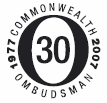Features | Dealing with complaints | Commonwealth Ombudsman Annual Report 2007-08
 Dealing with complaints Dealing with complaints | |
| 30th Anniversary SeminarAugust 2007 | FEATURE |
Members of the public are less likely to complain if they are unaware of the existence of a complaint resolution unit or agency. Mr Bill Dee of Compliance and Complaints Advisory Services urged agencies to make their contact details prominent in brochures, websites, telephone directories and at the point of service delivery. Information about the complaint-handling process should be easily accessible. A customer-focus is important too: ‘Organisations should have a primary focus of the world from the user’s perspective, not from the organisation’s’, he said. Ms Clare Petre, the Energy and Water Ombudsman of NSW, spoke about Reaching our target audience. ‘Communication with potential users of our services is a constant challenge’, she noted. Ms Petre advised agencies to identify their target audience by analysing the available information, building relationships with key stakeholders and consulting widely to identify different ways to reach different groups. Information should be tailored to particular audiences. Mr Hank Jongen of Centrelink commented that agencies should ‘welcome feedback and use it to help improve the way they provide services to customers and the community’. It is important that agencies not discriminate against, or disadvantage, anyone who provides feedback or lodges a complaint. There should also be an escalation process for complex complaints, and procedures for dealing with difficult or persistent complainants. | |
 There are many issues to consider in developing effective complaint handling and improving the services provided to the public.
There are many issues to consider in developing effective complaint handling and improving the services provided to the public.